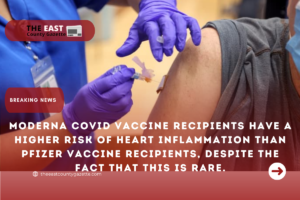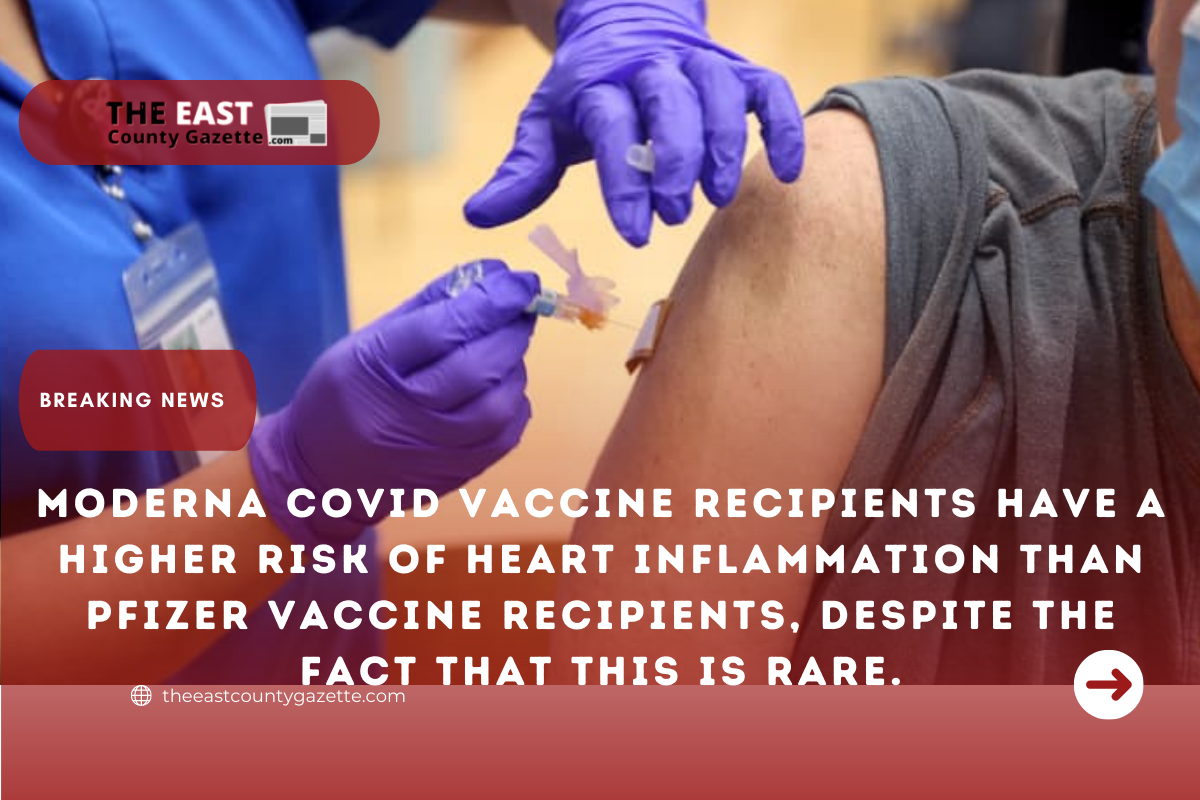According to a panel of outside experts convened by the Centers for Disease Control and Prevention, Moderna’s two-dose Covid-19 vaccine is associated with a higher risk of heart inflammation than Pfizer’s, but the benefits of both companies’ shots outweigh the risks, according to the panel.
The Centers for Disease Control and Prevention’s Advisory Committee on Immunization Practices met Friday to discuss the risks of developing myocarditis after receiving vaccines from Moderna or Pfizer.

According to the National Heart, Lung, and Blood Institute, myocarditis is an inflammation of the heart muscle that can lead to serious health problems if not treated promptly.
Despite the fact that myocarditis is most commonly caused by a viral infection, the Centers for Disease Control and Prevention (CDC) has discovered a link between heart inflammation and vaccination with Moderna and Pfizer’s shots.
Read More: Surprisingly! Now Mothers of Young Children can Be Eligible for a $1,000 Per Month Stimulus.
The risk of myocarditis following Covid vaccination is highest in teenage boys and young men following the second dose of mRNA vaccines, which is the technology used by both Moderna and Pfizer to manufacture their vaccines.
After receiving the vaccination, symptoms such as chest pain, shortness of breath, heart palpitations, and fatigue begin to manifest themselves within a few days.
Myocarditis has been linked to both Pfizer’s and Moderna’s vaccines, despite being a rare complication.
According to the Centers for Disease Control and Prevention’s safety surveillance program, which collects data from nine healthcare organizations in eight states, the risk was higher following the second dose of Moderna’s vaccine in people ages 18 to 39, according to the CDC.
According to the study, for every 1 million second doses administered, Moderna vaccine recipients experienced 10.7 additional cases of myocarditis and pericarditis compared to those who received Pfizer.
The disparity was even more pronounced in men who experienced 21.9 additional myocarditis and pericarditis cases as a result of Moderna’s second shot, compared to only 1.6 additional cases in women.
Those who received the shots from either company, on the other hand, reported no difference in the symptoms they experienced. According to the findings of the study, the majority of patients were only in the hospital for a single day and no one was admitted to intensive care.
In Ontario, Canada, public health authorities discovered that the rate of myocarditis in males ages 18-24 following the second dose of Moderna’s vaccine was five times higher than the rate of myocarditis following the second dose of Pfizer’s vaccine.
Another finding was that the rate of myocarditis was higher among people in the same age group who received Pfizer as their first dose and Moderna as their second dose than it was among those who had only received two Pfizer injections.
A spokesperson for the Centers for Disease Control and Prevention (CDC) said that while more myocarditis cases were expected following Moderna’s vaccine, the company’s shots would also prevent more Covid hospitalizations than Pfizer’s vaccine. “At this point, the benefits of mRNA vaccines outweigh any potential risks,” Oliver stated.
When it comes to high-risk age groups, Canada, the United Kingdom, and several other countries have recommended Pfizer’s vaccine rather than Moderna’s shot. Professor of pediatrics at Ohio State University, Dr. Pablo Sanchez, believes the Centers for Disease Control and Prevention’s vaccine experts should consider making a similar recommendation.
According to Sanchez, “it’s possible that we should recommend a preference for Pfizer over Moderna at the very least in the highest-risk groups, such as younger males,” he told the committee.
Researchers are still trying to figure out what causes myocarditis after receiving the Covid vaccination. According to Canadian public health authorities, myocarditis rates were higher for both the Moderna and Pfizer vaccines when the time interval between the first and second doses was less than 30 days between the first and second doses.
In order to reduce the risk of myocarditis, the Centers for Disease Control and Prevention (CDC) is considering a longer interval of 8 weeks between the first and second doses of both companies’ vaccines.
Moderna’s vaccine is completely safe and effective for adults 18 years of age and older. In addition to being fully approved for those 16 and older, the Pfizer vaccine has been authorized on an emergency basis for children aged 5 to 15.
According to a survey of cardiologists and other healthcare providers conducted by the Centers for Disease Control and Prevention, the vast majority of people who developed myocarditis after receiving the Covid vaccine recovered completely and reported no negative impact on their quality of life.
According to the results of the survey, 81 percent of their patients who developed myocarditis after vaccination either recovered completely or most likely recovered within 37 weeks of their diagnosis. Other than that, 15 percent had made improvements, with only 1 percent had made no improvement.
Read More: Sent an Email by Mistake? Here’s How You Can Recall it Instantly!
After being diagnosed with myocarditis, the vast majority of patients (83 percent) experienced restrictions in their physical activity. However, at the time of the survey, 39 percent were still subject to restrictions.
People who develop myocarditis are advised to refrain from engaging in strenuous physical activity for a few months in order to ensure that their hearts have recovered completely.
According to the data, there were no known deaths from myocarditis in the group as a result of the vaccination.
According to the Department of Health and Human Services, people who contract Covid infection have a significantly higher risk of developing myocarditis than those who receive vaccines.
According to a recent paper published in Nature Reviews Cardiology, the risk of developing myocarditis after receiving the Covid vaccine is 100 times higher than the risk of developing the condition after receiving the vaccine.
“There’s a danger in focusing on the vaccine and myocarditis when the elephant in the room is really a true disease, true infection from COVID-19, and the potentially devastating, even life-threatening myocarditis,” said Dr. Camille Kotton, an infectious disease expert at Massachusetts General Hospital in Boston who specializes in infectious diseases and people with compromised immune systems.

